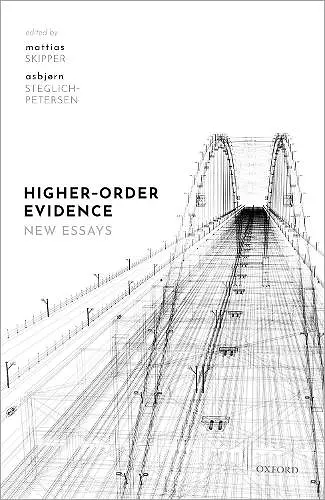Higher-Order Evidence
New Essays
Mattias Skipper editor Asbjørn Steglich-Petersen editor
Format:Hardback
Publisher:Oxford University Press
Published:17th Oct '19
Currently unavailable, and unfortunately no date known when it will be back

We often have reason to doubt our own ability to form rational beliefs, or to doubt that some particular belief of ours is rational. Perhaps we learn that a trusted friend disagrees with us about what our shared evidence supports. Or perhaps we learn that our beliefs have been afflicted by motivated reasoning or by other cognitive biases. These are examples of higher-order evidence. While it may seem plausible that higher-order evidence should somehow impact our beliefs, it is less clear how and why. Normally, when evidence impacts our beliefs, it does so by virtue of speaking for or against the truth of theirs contents. But higher-order evidence does not directly concern the contents of the beliefs that they impact. In recent years, philosophers have become increasingly aware of the need to understand the nature and normative role of higher-order evidence. This is partly due to the pervasiveness of higher-order evidence in human life. But it has also become clear that higher-order evidence plays a central role in many epistemological debates, spanning from traditional discussions of internalism/externalism about epistemic justification to more recent discussions of peer disagreement and epistemic akrasia. This volume brings together, for the first time, a distinguished group of leading and up-and-coming epistemologists to explore a wide range of interrelated issues about higher-order evidence.
The book provides rich historical context and compiles a huge wealth of data in one place. It will be of interest to any student of phonological development, especially those who are interested in a concrete framework for defining and measuring a childs phonological patterns from a larger lexical perspective. At the same time, with its references to exemplar theory (e.g. Jusczyk 1992) and Dynamic Systems Theory (Thelen & Smith 1994), the book is also relevant for those more broadly interested in cognitive development. Data from children learning a variety of languages, along with detailed appendices of childrens productions and adult templatic forms, will be tantalising for linguists who may want to do further analyses. * Ashley Farris-Trimble, Simon Fraser University, Phonology *
This is the first volume to be entirely dedicated to issues concerning higher-order evidence, and it will go a long way in advancing and shaping these relatively new debates. Higher-Order Evidence is sure to be of great interest to anyone captivated with contemporary debates in epistemology, particularly those with an interest in formal epistemology. * Jonathan Matheson, Metascience *
ISBN: 9780198829775
Dimensions: 235mm x 161mm x 23mm
Weight: 622g
336 pages